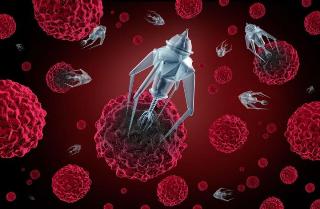Sep 2 2015
Scientists have been studying ways to use synthetic DNA as a building block for smaller and faster devices. DNA has the advantage of being inherently "coded". Each DNA strand is formed of one of four "codes" that can link to only one complementary code each, thus binding two DNA strands together.
 Scientists have developed a method, using a double layer of lipids, which facilitates the assembly of DNA origami units, bringing us one-step closer to DNA nanomachines. Credit:Kyoto University's Institute for Integrated Cell-Material Sciences
Scientists have developed a method, using a double layer of lipids, which facilitates the assembly of DNA origami units, bringing us one-step closer to DNA nanomachines. Credit:Kyoto University's Institute for Integrated Cell-Material Sciences
Scientists are using this inherent coding to manipulate and "fold" DNA to form "origami nanostructures": extremely small two- and three-dimensional shapes that can then be used as construction material to build nanodevices such as nanomotors for use in targeted drug delivery inside the body.
Despite progress that has been made in this field, assembling DNA origami units into larger structures remains challenging.
A team of scientists at Kyoto University's Institute for Integrated Cell-Material Sciences (iCeMS) has developed an approach that could bring us one step closer to the nanomachines of the future.
They used a double layer of lipids (fats) containing both a positive and a negative charge. DNA origami structures were weakly absorbed onto the lipid layer through an electrostatic interaction. The weak bond between the origami structures and the lipid layer allowed them to move more freely than in other approaches developed by scientists, facilitating their interaction with one another to assemble and form larger structures.
"We anticipate that our approach will further expand the potential applications of DNA origami structures and their assemblies in the fields of nanotechnology, biophysics and synthetic biology," says chemical biologist Professor Hiroshi Sugiyama from iCeMS.